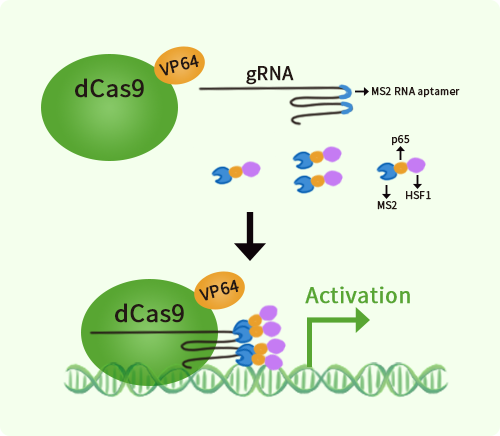Human GPR149 activation kit by CRISPRa
CAT#: GA117595
GPR149 CRISPRa kit - CRISPR gene activation of human G protein-coupled receptor 149
CNY 12,255.00
Specifications
| Product Data | |
| Format | 3 gRNAs (5ug each), 1 scramble ctrl (10ug) and 1 enhancer vector (10ug) |
| Symbol | GPR149 |
| Locus ID | 344758 |
| Kit Components | GA117595G1, GPR149 gRNA vector 1 in pCas-Guide-GFP-CRISPRa GA117595G2, GPR149 gRNA vector 2 in pCas-Guide-GFP-CRISPRa GA117595G3, GPR149 gRNA vector 3 in pCas-Guide-GFP-CRISPRa 1 CRISPRa-Enhancer vector, SKU GE100056 1 CRISPRa scramble vector, SKU GE100077 |
| Disclaimer | These products are manufactured and supplied by OriGene under license from ERS. The kit is designed based on the best knowledge of CRISPRa SAM technology. The efficiency of the activation can be affected by many factors, including nucleosome occupancy status, chromatin structure and the gene expression level of the target, etc. |
| Reference Data | |
| RefSeq | NM_001038705 |
| Synonyms | IEDA; PGR10 |
| Summary | This gene encodes a seven-transmembrane G protein coupled receptor (GPCR) class A family member. Although categorized as a class A GPCR, the encoded protein lacks the first two charged amino acids of the highly conserved Asp-Arg-Tyr (DRY) motif found in the third transmembrane helix of class A receptors which is important for efficient G protein-coupled signal transduction. Mice with a knockout of the orthologous gene are viable and have normal maturation of the ovarian follicle, but show enhanced fertility and ovulation. All GPCRs have a common structural architecture consisting of seven transmembrane alpha-helices interconnected by three extracellular and three intracellular loops. A general feature of GPCR signaling is agonist-induced conformational changes in the receptor, leading to activation of the heterotrimeric G proteins, which consist of the guanine nucleotide-binding G-alpha subunit and the dimeric G-beta-gamma subunits. The activated G proteins then bind to and activate numerous downstream effector proteins, which generate second messengers that mediate a broad range of cellular and physiological processes. [provided by RefSeq, Jul 2017] |
Documents
Resources
| 基因表达相关资源 |
Other Versions
| SKU | Description | Size | Price |
|---|---|---|---|
| KN423772 | GPR149 - KN2.0, Human gene knockout kit via CRISPR, non-homology mediated. |
CNY 8,680.00 |


 United States
United States
 Germany
Germany
 Japan
Japan
 United Kingdom
United Kingdom
 China
China

